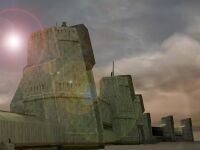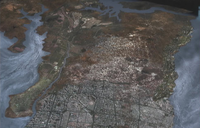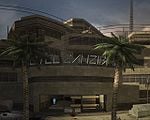Old Mombasa: Difference between revisions
From Halopedia, the Halo wiki
Halopediaman (talk | contribs) mNo edit summary |
No edit summary |
||
| Line 13: | Line 13: | ||
'''Old Mombasa''' is the older, more run-down sector in [[Mombasa]], [[Republic of Kenya|Kenya]] on [[Earth]]. All municipalities within a 74 km radius of the island-city of [[New Mombasa]] are unofficially referred to as Old Mombasa. While New Mombasa was a dynamic, cosmopolitan city, Old Mombasa was much more dilapidated. | '''Old Mombasa''' is the older, more run-down sector in [[Mombasa]], [[Republic of Kenya|Kenya]] on [[Earth]]. All municipalities within a 74 km radius of the island-city of [[New Mombasa]] are unofficially referred to as Old Mombasa. While New Mombasa was a dynamic, cosmopolitan city, Old Mombasa was much more dilapidated. | ||
==Description== | ==Description== | ||
[[File:Turf.PNG|thumb|The multiplayer map Turf, showcasing the architecture of Old Mombasa.]] | [[File:Turf.PNG|thumb|left|The multiplayer map Turf, showcasing the architecture of Old Mombasa.]] | ||
Old Mombasa surrounds [[Wikipedia:Mombasa Island|Mombasa Island]], which now houses the metropolis of [[New Mombasa]]. The island is located between two ocean inlets, [[Wikipedia:Tudor Creek|Tudor Creek]] to the north and [[Wikipedia:Kilindini Harbour|Kilindini Harbour]] to the south. Old Mombasa is located across these bodies of water on both sides of the island. Originally, the city extended to a peninsula between the creeks northwest of the island, but due to global warming and the subsequent rise of sea levels, and the possible creation of an artificial waterway deep inland, this landmass is completely submerged by the 26th century. | Old Mombasa surrounds [[Wikipedia:Mombasa Island|Mombasa Island]], which now houses the metropolis of [[New Mombasa]]. The island is located between two ocean inlets, [[Wikipedia:Tudor Creek|Tudor Creek]] to the north and [[Wikipedia:Kilindini Harbour|Kilindini Harbour]] to the south. Old Mombasa is located across these bodies of water on both sides of the island. Originally, the city extended to a peninsula between the creeks northwest of the island, but due to global warming and the subsequent rise of sea levels, and the possible creation of an artificial waterway deep inland, this landmass is completely submerged by the 26th century. | ||
| Line 23: | Line 22: | ||
== History == | == History == | ||
[[File:OutskirtsOuter Wall16001200.jpg|thumb|The seawalls of Old Mombasa.]] | [[File:OutskirtsOuter Wall16001200.jpg|thumb|The seawalls of Old Mombasa.]] | ||
The mainland districts were stifled, ironically, by their thirst for growth. During the 21st and 22nd centuries, sea levels worldwide began rising due to global warming. Port cities around the planet were faced with a choice: construct flood control measures, or drown. In Mombasa, it was decided that | The mainland districts were stifled, ironically, by their thirst for growth. During the 21st and 22nd centuries, sea levels worldwide began rising due to global warming. Port cities around the planet were faced with a choice: construct flood control measures, or drown. In Mombasa, it was decided that rather than shore up the old docks on Mombasa Island, it would be easier to build brand new ports on the mainland, southwest of the city. So massive seawalls were built to hold back the rising waters, and new dock structures extended out into Kilindini Harbor. | ||
For a time, these docks brought prosperity to the mainland. Shantytowns were demolished to make way for new office buildings, highways were constructed, and commerce thrived. But by the end of the 23rd century, global warming began to reverse as new technologies emerged and millions of people departed Earth for colonies in the rest of the UNSC-controlled space. Sea levels began receding as temperatures dropped worldwide. In time, the port facilities on the mainland were left literally high and dry. | For a time, these docks brought prosperity to the mainland. Shantytowns were demolished to make way for new office buildings, highways were constructed, and commerce thrived. But by the end of the 23rd century, global warming began to reverse as new technologies emerged and millions of people departed Earth for colonies in the rest of the UNSC-controlled space. Sea levels began receding as temperatures dropped worldwide. In time, the port facilities on the mainland were left literally high and dry. | ||
| Line 29: | Line 28: | ||
Unfortunately, interstellar travel was discovered just as the mainland's ports became useless. In the dawn of the 24th century, Mombasa was chosen to be Earth's first [[Space Elevator|tether]] city. As a result, the [[New Mombasa Orbital Elevator]] and its attendant port system was constructed on Mombasa Island. Consequently, the island-city transformed into the hi-tech metropolis of New Mombasa, while the mainland area languished, closed off behind its useless seawall. | Unfortunately, interstellar travel was discovered just as the mainland's ports became useless. In the dawn of the 24th century, Mombasa was chosen to be Earth's first [[Space Elevator|tether]] city. As a result, the [[New Mombasa Orbital Elevator]] and its attendant port system was constructed on Mombasa Island. Consequently, the island-city transformed into the hi-tech metropolis of New Mombasa, while the mainland area languished, closed off behind its useless seawall. | ||
=== Covenant | === Covenant invasion === | ||
[[File:OM_north.png|thumb|200px|Mainland north of Mombasa island.]] | [[File:OM_north.png|thumb|200px|Mainland north of Mombasa island.]] | ||
On [[2552#October|October 20, 2552]], the [[Covenant Empire]] [[Battle of Earth|invaded Earth]]. During the orbital battle, the [[Prophet of Regret]]'s [[Regret's Carrier|Flagship]] slipped past Earth's defense grid and descended near the surface, and started deploying troops in both New and Old Mombasa. During [[Battle of Mombasa|the battle]], three [[Dropship 77-Troop Carrier|Pelican dropships]], one with [[John-117|SPARTAN-117]] onboard, were deployed to the city with the mission to capture the Prophet of Regret. On their way to New Mombasa, all of the Pelicans were shot down by a Covenant [[Type-47 Ultra Heavy Assault Platform|Scarab]], and crash-landed in Old Mombasa Sector 0-5. Throughout the rest of the mission, the Chief, accompanied by [[Avery J. Johnson|Sergeant Johnson]] and a number of [[UNSC Marine Corps|UNSC Marines]], fights through the slums of the old city, to the [[Hotel Zanzibar]], out onto the beaches, and finally to the underground [[New Mombasa 105 East|highway system]] that connects the city to [[New Mombasa]].<ref>'''[[Halo 2]]''', campaign level, ''[[Outskirts (Level)|Outskirts]]''</ref> | On [[2552#October|October 20, 2552]], the [[Covenant Empire]] [[Battle of Earth|invaded Earth]]. During the orbital battle, the [[Prophet of Regret]]'s [[Regret's Carrier|Flagship]] slipped past Earth's defense grid and descended near the surface, and started deploying troops in both New and Old Mombasa. During [[Battle of Mombasa|the battle]], three [[Dropship 77-Troop Carrier|Pelican dropships]], one with [[John-117|SPARTAN-117]] onboard, were deployed to the city with the mission to capture the Prophet of Regret. On their way to New Mombasa, all of the Pelicans were shot down by a Covenant [[Type-47 Ultra Heavy Assault Platform|Scarab]], and crash-landed in Old Mombasa Sector 0-5. Throughout the rest of the mission, the Chief, accompanied by [[Avery J. Johnson|Sergeant Johnson]] and a number of [[UNSC Marine Corps|UNSC Marines]], fights through the slums of the old city, to the [[Hotel Zanzibar]], out onto the beaches, and finally to the underground [[New Mombasa 105 East|highway system]] that connects the city to [[New Mombasa]].<ref>'''[[Halo 2]]''', campaign level, ''[[Outskirts (Level)|Outskirts]]''</ref> | ||
When Regret's Carrier jumped into slipspace above the city, the jump created a large crater into Old Mombasa, north of the Mombasa island. The Slipspace | When Regret's Carrier jumped into slipspace above the city, the jump created a large crater into Old Mombasa, north of the Mombasa island. The Slipspace rift also sucked several city blocks through, and some of the buildings ended up in outer space near [[Installation 05]]. After the battle, large portions of Old Mombasa were [[Glassing|glassed]] by the [[Truth's fleet|Covenant fleet]] in order to unearth the [[Forerunner]] [[The Artifact|portal artifact]] the city was built upon.<ref>'''[[Halo 3: ODST]]'''</ref> | ||
{{clear}} | {{clear}} | ||
== Locations == | == Locations == | ||
*[[Grid Kilo 23]] | *[[Grid Kilo 23]] | ||
*[[Hope Station]] | |||
*[[Hotel Zanzibar]] | |||
*[[Liberty Street]] | |||
*[[Magongo]] | |||
*[[Nairobi Road]] | |||
*[[Nyali Road]] | |||
*[[Obote Avenue]] | |||
*[[Sector 0-5]] | *[[Sector 0-5]] | ||
*[[Voi Theater]] | *[[Voi Theater]] | ||
Revision as of 08:24, January 31, 2011
Template:Ratings Template:City
Old Mombasa is the older, more run-down sector in Mombasa, Kenya on Earth. All municipalities within a 74 km radius of the island-city of New Mombasa are unofficially referred to as Old Mombasa. While New Mombasa was a dynamic, cosmopolitan city, Old Mombasa was much more dilapidated.
Description
Old Mombasa surrounds Mombasa Island, which now houses the metropolis of New Mombasa. The island is located between two ocean inlets, Tudor Creek to the north and Kilindini Harbour to the south. Old Mombasa is located across these bodies of water on both sides of the island. Originally, the city extended to a peninsula between the creeks northwest of the island, but due to global warming and the subsequent rise of sea levels, and the possible creation of an artificial waterway deep inland, this landmass is completely submerged by the 26th century.
Old Mombasa's architecture architecture is an odd hodgepodge of old and new: 16th-century Muslim arcades, aging 21st-century office buildings, looming 26th-century power couplings. Old concrete homes secured with computerized locks. Clotheslines strung next to power lines. Mechanical gates set into ancient brick walls. The culture also seems displaced; while New Mombasa is populated with industrial workers and ambitious cosmopolitans, Old Mombasa is considered to be more of a slum. The residents of Old Mombasa even spoke their own dialect, indicating their isolation.[1]
History
The mainland districts were stifled, ironically, by their thirst for growth. During the 21st and 22nd centuries, sea levels worldwide began rising due to global warming. Port cities around the planet were faced with a choice: construct flood control measures, or drown. In Mombasa, it was decided that rather than shore up the old docks on Mombasa Island, it would be easier to build brand new ports on the mainland, southwest of the city. So massive seawalls were built to hold back the rising waters, and new dock structures extended out into Kilindini Harbor.
For a time, these docks brought prosperity to the mainland. Shantytowns were demolished to make way for new office buildings, highways were constructed, and commerce thrived. But by the end of the 23rd century, global warming began to reverse as new technologies emerged and millions of people departed Earth for colonies in the rest of the UNSC-controlled space. Sea levels began receding as temperatures dropped worldwide. In time, the port facilities on the mainland were left literally high and dry.
Unfortunately, interstellar travel was discovered just as the mainland's ports became useless. In the dawn of the 24th century, Mombasa was chosen to be Earth's first tether city. As a result, the New Mombasa Orbital Elevator and its attendant port system was constructed on Mombasa Island. Consequently, the island-city transformed into the hi-tech metropolis of New Mombasa, while the mainland area languished, closed off behind its useless seawall.
Covenant invasion
On October 20, 2552, the Covenant Empire invaded Earth. During the orbital battle, the Prophet of Regret's Flagship slipped past Earth's defense grid and descended near the surface, and started deploying troops in both New and Old Mombasa. During the battle, three Pelican dropships, one with SPARTAN-117 onboard, were deployed to the city with the mission to capture the Prophet of Regret. On their way to New Mombasa, all of the Pelicans were shot down by a Covenant Scarab, and crash-landed in Old Mombasa Sector 0-5. Throughout the rest of the mission, the Chief, accompanied by Sergeant Johnson and a number of UNSC Marines, fights through the slums of the old city, to the Hotel Zanzibar, out onto the beaches, and finally to the underground highway system that connects the city to New Mombasa.[2]
When Regret's Carrier jumped into slipspace above the city, the jump created a large crater into Old Mombasa, north of the Mombasa island. The Slipspace rift also sucked several city blocks through, and some of the buildings ended up in outer space near Installation 05. After the battle, large portions of Old Mombasa were glassed by the Covenant fleet in order to unearth the Forerunner portal artifact the city was built upon.[3]
Locations
- Grid Kilo 23
- Hope Station
- Hotel Zanzibar
- Liberty Street
- Magongo
- Nairobi Road
- Nyali Road
- Obote Avenue
- Sector 0-5
- Voi Theater
Trivia
- While not accessible in Halo 3: ODST, Old Mombasa can be seen in the background during some campaign levels. It should be noted that the bridge connecting Old Mombasa to New Mombasa in Halo 2 is missing from Halo 3: ODST. This is likely due to the fact the game is set on the other side of the city and the entire north-western side of Mombasa has no modeled geometry.
Gallery
Panoramic view of the skyline. Note tusk-shaped archway similar to a pair present in modern-day Mombasa.
Hotel Zanzibar in Old Mombasa.
- Longshorepic.jpg
A port in Old Mombasa.
- OM concept.png
Concept art of a street in Old Mombasa.
List of appearances
Sources
- ^ Halo Graphic Novel, Second Sunrise Over New Mombasa
- ^ Halo 2, campaign level, Outskirts
- ^ Halo 3: ODST


